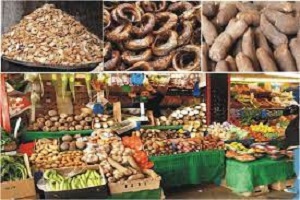Nigeria’s annual inflation rate rose from 22.41 per cent in May to 22.79 per cent in June, the National Bureau of Statistics (NBS) announced Monday.
NBS said the June inflation rate showed an increase of 0.38 per cent points compared to May 2023 headline inflation rate.
The statistics office said on a year-on-year basis, the headline inflation rate was 4.19 per cent points higher compared to the rate recorded in June 2022, which was 18.60 per cent.
“This shows that the Headline inflation rate (year-on-year basis) increased in June 2023 when compared to the same month in the preceding year (i.e., June 2022),” it said.
According to the report, the food inflation rate quickened to 25.25 per cent in June from 24.82 per cent in May.
Inflation has remained high in Africa’s largest economy, prompting the apex bank to hike interest rates to their highest levels in nearly two decades.
In an aggressive push to contain the nation’s inflationary pressure, the Central Bank of Nigeria, in May, raised its benchmark lending rate to 18.5 per cent.
State emergency on food insecurity
The inflationary trend is caused by the removal of fuel subsidy as announced by President Bola Tinubu in his inaugural address on May 29.
Following the announcement, the Nigerian National Petroleum Company Limited (NNPCL) directed its outlets nationwide to sell fuel between N480 and N570 per litre, an almost 200 per cent increase from the initial price below N200.
The hike immediately triggered an increase in transportation fares and prices of goods and services by various percentages.
Last Thursday, Mr Tinubu declared an immediate state of Emergency on food insecurity to tackle the increase in food prices.
He also directed that “all matters pertaining to food & water availability and affordability, as essential livelihood items, be included within the purview of the National Security Council.”
CBN
One of Emefiele’s deputies, Folashodun Shonubi, is currently acting central bank governor.
Data from Nigeria’s National Bureau of Statistics showed food inflation (NGFINF=ECI) was a key driver of the increase in the headline rate.
Inflation has been in double-digits in Africa’s biggest economy since 2016, eroding savings and incomes.
At its last monetary policy meeting in May, the central bank under Emefiele hiked its main interest rate by 50 basis points to 18.50% (NGCBIR=ECI).
Breakdown
In its inflation report Monday, the NBS said the contributions of items on the divisional level to the acceleration in the headline index are food & non-alcoholic beverages (11.81 per cent), housing water, electricity, gas & other fuel (3.81 per cent), clothing & footwear (1.74 per cent), transport (1.48 per cent), furnishings & household equipment & maintenance (1.15 per cent), education (0.90 per cent), health (0.68 per cent), miscellaneous goods & services (0.38 per cent), restaurant & hotels (0.28 per cent), alcoholic beverage, tobacco & kola (0.25 per cent), recreation & culture (0.16 per cent) and communication (0.15 per cent).
On a month-on-month basis, the report said the headline inflation rate in June 2023 was 2.13 per cent, 0.19 per cent points higher than the rate recorded in May 2023 (1.94 per cent).
“This means that in June 2023, on average, the general price level was 0.19 per cent higher relative to May 2023.
“The percentage change in the average CPI for the twelve months ending June 2023 over the average of the CPI for the previous twelve months period was 21.54 per cent, showing a 5.00 per cent increase compared to 16.54 per cent recorded in June 2022,” the report said.
Food inflation
The Food inflation rate in June 2023 was 25.25 per cent on a year-on-year basis; this was 4.65 per cent points higher relative to the rate recorded in June 2022 (20.60 per cent).
The bureau said the rise in food inflation was caused by increases in prices of oil and fat, bread and cereals, fish, potatoes, yam and other tubers, fruits, meat, vegetable, Milk, cheese, and eggs.
“On a month-on-month basis, the Food inflation rate in June 2023 was 2.40 per cent. This was 0.21 per cent points higher compared to the rate recorded in May 2023 (2.19 per cent).
“The average annual rate of Food inflation for the twelve months ending June 2023 over the previous twelve-month average was 24.03 per cent. This was a 5.41 per cent points increase from the average annual rate of change recorded in June 2022 (18.62 per cent),” it said.
The report added that the core inflation, which excludes the prices of volatile agricultural produce, stood at 20.27 per cent in June 2023 on a year-on-year basis, up by 4.53 per cent compared to the 15.75 per cent recorded in June 2022.
It said the highest increases were recorded in prices of passenger transport by air, gas, vehicle spare parts, liquid fuel, fuels and lubricants for personal transport equipment, medical services, passenger transport by road, among others.
“On a month-on-month basis, the Core Inflation rate was 1.74 per cent in June 2023. It stood at 1.81 per cent in May 2023, down by 0.07 per cent.
“The average twelve months annual inflation rate was 18.71 per cent for the twelve months ending June 2023; this was 4.65 per cent points higher than the 14.06 per cent recorded in June 2022,” it said.

